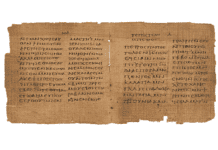Michael Porter Jr. of the Denver Nuggets tweeted a few short thoughts on the situation. First, he expressed sadness and outrage, plainly calling what happened “murder” and “evil.” But then he tweeted this:
“As much as you pray for George’s family, gotta also pray for the police officer(s) who were involved in this evil. As hard as it is, pray for them instead of hate them…Pray that God changes their hearts.”
The response was anything but supportive. Several fellow players and other followers labeled Porter’s tweet as tone-deaf, dismissive and a failure to “read the room.” I can understand that. When extreme injustices are committed, there is a God-designed yearning for justice. As I mentioned above, payment is required for a life lost and we know it in our bones. So when a horrible crime seems to be downplayed, we react. But on the other hand, a reaction against the extension of grace (such as prayer), exposes some natural human tendencies.
For one, we love to create categories of sinners. There are the good guys and the bad guys. But the way we typically draw the lines ensures that we are firmly in the good guy camp. So there are the Derek Chauvins of the world, along with all of those who are completely blind to the realities of systemic racism, and then there are people like me, who are enlightened enough to see other people’s blindness. That’s the potential problem when there’s nearly unanimous moral outrage. We all quickly align ourselves in such a way that we’re on the morally upright side. Of course, this is dangerous for several reasons.
First, it removes the spotlight from other sins that we may be more susceptible to. This is the point of James 2.
For whoever keeps the whole law but fails in one point has become guilty of all of it. For he who said, “Do not commit adultery,” also said, “Do not murder.” If you do not commit adultery but do murder, you have become a transgressor of the law. So speak and so act as those who are to be judged under the law of liberty. For judgment is without mercy to one who has shown no mercy. Mercy triumphs over judgment.
James 2:10-13
It’s easy to highlight one sin that we don’t commit (and be very unmerciful to those that commit it) and ignore a different sin that is dominating us.
Secondly, it often prevents us from seeing necessary growth areas in ourselves when we compare ourselves to the “real sinners.” Progressive writer Robin DiAngelo says this:
“I believe that white progressives cause the most daily damage to people of color. I define a white progressive as any white person who thinks he or she is not racist, or is less racist, or in the “choir,” or already “gets it.” White progressives can be the most difficult for people of color because, to the degree that we think we have arrived, we will put our energy into making sure that others see us as having arrived. None of our energy will go into what we need to be doing for the rest of our lives: engaging in ongoing, self-awareness, continuing education, relationship building, and actual antiracist practice. White progressives do indeed uphold and perpetrate racism, but our defensiveness and certitude make it virtually impossible to explain to us how we do so.”
I realize that many reading this would not label themselves as “progressives,” but in the sense that she is talking about, perhaps many of us are. We are “progressive” when it comes to race issues because we are enlightened and working hard to enlighten others about the realities of systemic racism. Yet human nature is such that we tend to consider ourselves as having achieved certain levels of “righteousness” when the reality is that we have a long way to go.
Thirdly, and perhaps most importantly, we are prevented from seeing how easily we could plunge into the same kind of horrific sin given the right circumstances.
We have a childhood family friend who went into law enforcement in a pretty rough part of the country. He witnessed unspeakable things and saw the absolute worst of humanity. Over time, unfortunately, he hardened. He began to see potential criminals as vermin. He went from a relatively tender-hearted person to a calloused cynic. He became the kind of person who would speak in dehumanizing ways about those “cockroaches” and then treat them as such when on duty.
As I consider the transformation of our family friend, and then witness what appeared to be the same attitude in Derek Chauvin as he kneeled on the neck of George Floyd, I have to ask, is that same potential in me? Given the right circumstances and experiences, could I just as easily turn into a monster?
In reality, I am Derek Chauvin. And if I’m going to initiate any positive change in this world, I have to start by identifying myself with him. As Walt Kelly said, “We have met the enemy, and he is us.”
Now, once we realize that we are the enemy, and no more deserving of life than Derek Chauvin, we have two options. The first one is despair. The second one is humbly acknowledging our condition and then receiving cleansing from the only one who can do the job.
Wretched man that I am! Who will deliver me from this body of death? Thanks be to God through Jesus Christ our Lord!
Romans 7:24-25
This is a critical moment in our lives and what we do with it will shape our nation and world for decades to come. But it starts with identification. We identify with the victims of bigotry and recognize the prevalence of injustice. And then we recognize ourselves as perpetrators of such injustice. From this place of empathy and humility, we can truly bring about change.
This article originally appeared here.











